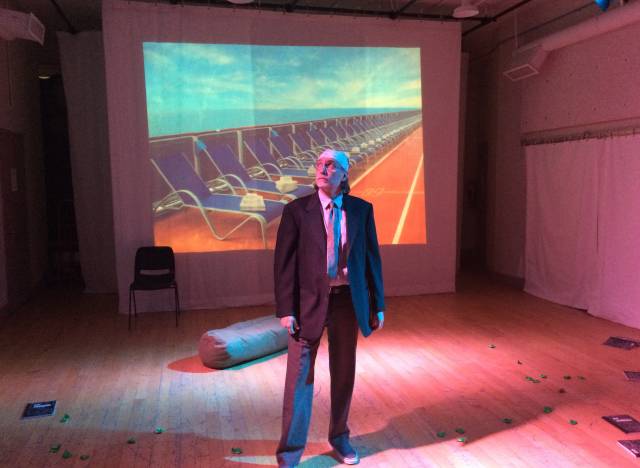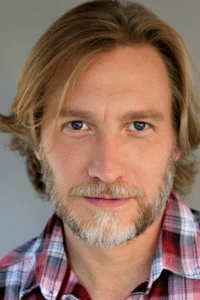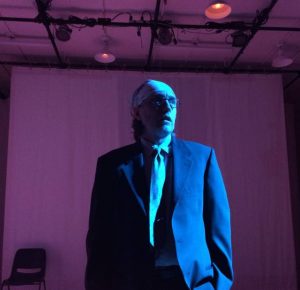

Last month, audiences at the New York International Fringe Festival were treated to the hilarious and thoughtful one-man show A Supposedly Fun Thing I’ll Never Do Again. The show brings David Foster Wallace’s classic essay to life, as performer Christopher Duva takes us through Wallace’s trials and tribulations onboard a seven-night Caribbean cruise. Though the Fringe Festival may have ended, A Supposedly Fun Thing will soon be returning to the New York stage for a five-performance run at the Soho Playhouse as part of the Fringe Encores Series. We spoke with Duva to learn more about the show's creation, its Fringe Festival run, and what David Foster Wallace works you should be reading next.
What first attracted you to A Supposedly Fun Thing and the idea of bringing it to the stage?
“Shipping Out,” (the original title of the essay published by Harpers Magazine in a much shorter version) was the first piece of Wallace’s I ever read. When my girlfriend (now my wife and the director of ASFTINDA), who knew Wallace through Amherst College alumni events, found out that my parents had dragged me on a lot of cruises as an adolescent, she suggested I read the essay. It was love at first beautifully-written observation. I have been reading and re-reading David Foster Wallace’s work ever since.
The idea of adapting the piece didn’t come until much later, however. I had corresponded with Wallace and his agent, Bonnie Nadell, about adapting parts of Brief Interviews with Hideous Men as a one-person show. At that point, the rights had already been optioned for a film. A few years ago, I came across the letter from Wallace responding to my query and it felt like unfinished business. I then realized that the piece I had the strongest personal connection to was ASFTINDA and that that was the piece of Wallace’s I should be adapting for the stage. I put together a proposal for Bonnie and Wallace’s widow, Karen Green, and they generously allowed me to pursue it.

Your piece uses a slightly edited version of Wallace’s essay. How did you approach adapting the essay for the theatre? Was there anything in particular you were trying to emphasize or bring out?
“Slightly” is a bit of an understatement. Read aloud in its entirety (and I did that in preparation for figuring out just how much I’d have to cut) the essay is ten and a half hours long. It killed me to have to leave out so many brilliant observations. The one thing I kept reminding myself of throughout the process was that, in cutting it down to a suitable running time, I would be confident that everything in the show was Wallace’s writing at its absolute finest (at least in my opinion).
In terms of shaping the show, I was always clear that the actual timeline of the cruise needed to be established for the audience’s sake. The original essay progresses thematically, rather than chronologically. In restructuring it into a chronological narrative, I had to sort of excavate Wallace’s emotional journey as the week went on. One of the things that really helped me as I adapted the piece was knowing from the outset what I wanted the ending to be. It is a much different ending from the published piece — I don't want to give anything away for people who have not seen it — but I have always felt that what I made the ending of my show should have been the ending of the essay.
I came into A Supposedly Fun Thing having already read the essay, but the performance seemed like a great introduction to the essay and Wallace’s writing for those that hadn’t.
That’s so nice to hear. Thank you. I have never been one of those people who felt that Wallace’s writing or thought-process was overwhelming or inaccessible. A lot of people have said that Wallace captured “the brain-voice”. Coming from a theater background, I’ve always associated that voice with the soliloquy, the inner monologue shared with the audience. And adapting ASFTINDA for the stage, I was always aware of that. One of the great things about experiencing Wallace’s words in the theater is that there is an interpreter, a guide to lead you through the complex thoughts and sub-clauses. I want the audience to be engaged and to listen thoughtfully and to pay attention, but I do not want them to feel like they have to work to understand.
If someone just discovered his work through your show and wanted to read more, what other David Foster Wallace works would you recommend?
I suggest that people visit www.thehowlingfantods.com, which has been publishing news and DFW resources since 1997. In fact, it is so authoritative that the official DFW site refers readers to it. And there is a whole “Resources” section titled “New to DFW?”
Personally, I think people get too hung up on Infinite Jest as a touchstone for reading Wallace. It’s like deciding you want to get into shape and immediately entering a triathlon. My recommendation for the best place to start for fiction is Brief Interviews with Hideous Men.The pieces are short, hysterically funny and, if one reads the book in its entirety, they start to take on a really sinister air that makes you question just what it was you were laughing at in the first place. For Wallace’s non-fiction work, a lot of his magazine pieces are available on the web and their topics are so varied that I’d suggest that readers start with a topic that interests them. For instance, if you like sports, read “Federer as Religious Experience,” if you like reading about food, try “Consider the Lobster,” and for a political piece, try “McCain’s Promise,” and, of course, if you’re into pornography and you feel like reading about it, go forth and read “Big Red Son.”
What are your favorites?
Given that I was an “experienced” Wallace reader at the point this book came out, Infinite Jest was one of the greatest reading experiences of my life. It’s obvious what my favorite essay is and my favorite short stories are “Forever Overhead” and ”Oblivion”.

How was your experience performing the show at the Fringe Festival?
It was quite amazing. I had been working on this piece on my own for two years, so to have the first performances not only sell-out, but get such a consistently positive audience and critical response was more than I could have hoped. Plus, every Wallace fan who has seen the show and talked to or e-mailed me about it afterward has been extremely positive, so that has been particularly gratifying.
Your background as an actor is pretty diverse, including film, TV, improv, and theatre. What kind of work are you most attracted to or inspired by as an actor?
I think the diversity of the work, whether it be the type of presentation (theater, film, TV) or the form (drama, musical, improv) is the very thing that keeps me interested and inspired. I really enjoy being the conduit through which stories are told whether it be in a classical play, or a short web video or a one-word suggestion from an audience member on a blank stage.
Do you have any future plans or aspirations for A Supposedly Fun Thing following its Fringe Encores run?
Because nothing is concrete at this point, it is all aspirational. I’d love it to have a run in New York and then either have the opportunity to tour the show, or to bring it to a bunch of different cities. Part of the joy of this process has been connecting to DFW fans around the world, and “When are you coming to blank?” is the most common question I get.
Beyond that, I’d love the person who owns the rights to Infinite Jest (he knows who he is) to get in touch with me, because I know exactly how we should adapt it.
A Supposedly Fun Thing I'll Never Do Again will be performed as part of the Fringe Encore series, September 13-22 at the SoHo Playhouse.